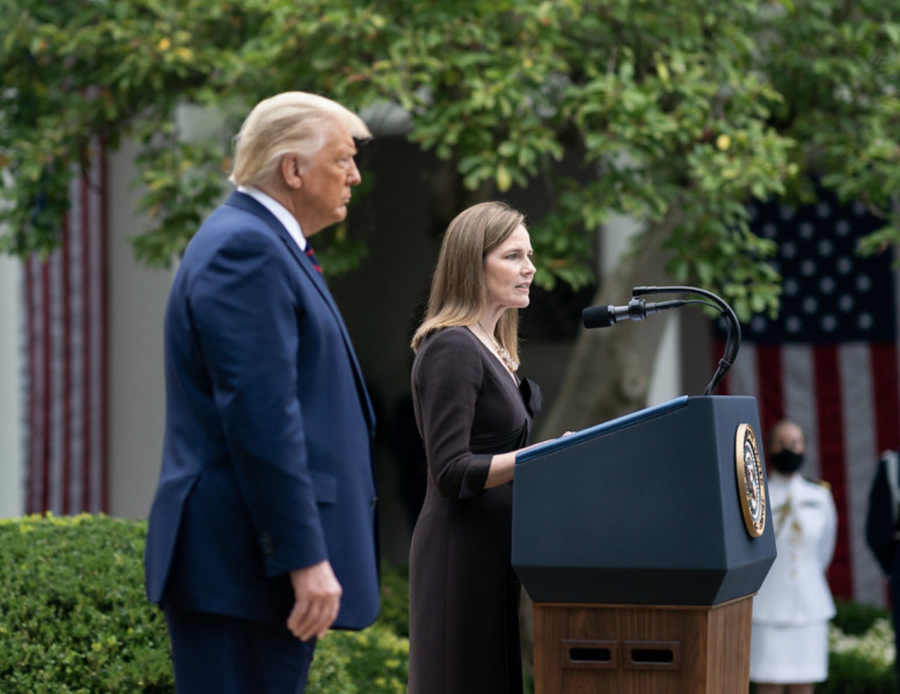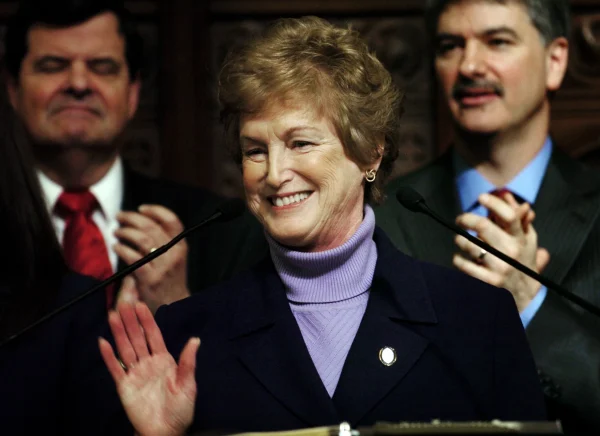Trump Nominates Judge Amy Coney Barrett to Supreme Court Vacancy
In a press conference on Sept. 26, President Donald Trump announced judge Amy Coney Barrett as his nomination to fill the Supreme Court Justice vacancy left by the late Justice Ruth Bader Ginsberg. His decision has sparked controversy because of both the proximity of the appointment to the presidential election and Barrett’s political ideologies.
Qualifications
Barrett was a clerk for Judge Laurence H. Silberman in the U.S. Court of Appeals for D.C. and then for Supreme Court Justice Antonin Scalia from 1997-1999. She practiced criminal and civil law from 1999-2001 as an associate with Miller, Cassidy, Larroca & Lewin L.L.P. and then at Baker Botts L.L.P.
In academia, Barrett contributed to 12 peer-reviewed articles that were published in journals such as the Columbia Law Review and Texas Law Review.
Barrett’s presence in the court system resumed in 2010 when Chief Justice John Roberts appointed her to sit on the Advisory Committee on Federal Rules of Appellate Procedure where she served for six years. In 2017, Trump nominated Barrett to the U.S. Court of Appeals for the Seventh Circuit; she was confirmed in Sept. 2017 and has served as a judge up to the present.
If appointed, Barrett would be the youngest Supreme Court Justice in history, and the fifth woman to serve on the bench.
Push Back
Pres. Trump’s decision to appoint Barrett, a little over one month from the 2020 presidential election, has received criticism.
Before Ginsburg’s death, she said, “My most fervent wish is that I will not be replaced until a new president is installed,” days before her death.
Ginsberg’s wish was not without precedent. In 2016, Senate Majority Leader Mitch McConnell and the Senate blocked President Barack Obama’s Supreme Court Justice nomination, Judge Merrick Garland.
McConnell said, “The Senate will appropriately revisit the matter when it considers the qualifications of the nominee the next president nominates, whoever that might be,” and was supported by senate judiciary chair, Charles Grassley, speaker of the house, Paul Ryan, and then-presidential nominee, Trump.
Trump said on Good Morning America in 2016, “I think they [the Senate] should wait until the next president and let the next president pick.”
According to a CNBC article, with his 2020 nomination of Barrett, Trump has justified his push to confirm Barrett, saying the outcome of the presidential election will depend on the Supreme Court and that a full bench is needed.
On Sept. 18, presidential candidate Joseph Biden repeated Trump’s words from 2016, “But there is no doubt, let me be clear, that the voters should pick the president, and the president should pick the justice for the Senate to consider.”
Obama said similar words in his statement on the Passing of Justice Ruth Bader Ginsburg.
Ideology Concerns
The timing of her nomination is not the only controversy. Democrats question Barrett’s political ideologies and how that will affect her decisions as a Supreme Court Justice.
If Barrett is confirmed, the Supreme Court bench will consist of predominantly conservative Justices with Clarence Thomas, Samuel Alito, John Roberts, Neil Gorsuch, Brett Kavanaugh, and Barrett leaning right as Stephan Breyer, Sonia Sotomayor, and Elena Kagan lean left on the political spectrum.
People question how her religious beliefs will factor in her decisions if confirmed. Barrett has been linked to the People of Praise religious organization, a Catholic-based community whose central tenet is that men are to serve as the “head” of the household and that a wife is subject to his rule. Ex-members of the organization have claimed the organization to be cult-like and demands total subjugation of females, whereas current members state that this is not the case at all and, in fact, women play a role in decision making and leadership within the community.
The combination of Trump expressing intent, in a 2016 presidential debate, to only appoint justices who are “pro-life” and Barrett’s self-professed Catholic faith, her views on abortion have been questioned.
In her Senate confirmation hearings for her appointment to the 7th U.S. Circuit Court of Appeals, Barrett stated, “All nominees are united in their belief that what they think about a precedent should not bear on how they decide cases,” in response to a question regarding her personal beliefs on the case of Roe v. Wade.
If Roe v. Wade is overturned, the decision on how abortion is restricted and controlled would differ state by state, as each state government would be allowed to establish their own policies. In effect, the access a person has to abortion would be dependent on their geographical residence.
On Nov. 10, the Supreme Court is scheduled to hear two matters regarding the Affordable Care Act (ACA), an Obama Administration era policy. According to a New York Times article, Barrett has consistently opposed the ACA; Trump’s nomination of Barrett and his outspoken opposition to the ACA suggests that he believes Barrett will rule against the ACA.
As the appointment of Barrett is dependent on the Senate’s approval, different lobbying groups have begun to work to sway the votes of Senators either for or against the appointment.
The Human Rights Campaign has declared Barrett a “threat to LGBTQ rights,” reproductive rights, and voting rights, because of her past academic and judicial career. They have launched a “We Dissent” campaign in opposition to Barrett’s appointment.
Americans for Prosperity have initiated a grassroots campaign in support of Barrett’s nomination that began with 200,000 letters sent to senators urging their support and continues with a text and call campaign to constituents to contact senators. The group’s senior vice president, Casey Maddox, said that he is confident that Barrett is someone, “who is going to defend our freedoms, and not legislate from the bench.”
Moving Forward
Despite controversy, Barrett has begun the process of her nomination consideration as she began meeting with GOP Senators on Sept. 27. This is a customary step most nominees take ahead of their confirmation hearing. Barrett’s confirmation hearings are scheduled to begin on Oct. 12, according to Sen. Lindsey Graham on Fox News’ “Sunday Feature.”
In order for Barrett to be confirmed, the Senate will have to vote affirmatively in a simple majority – over 50 votes – after the hearings and following debate has concluded.
McConnell has yet to comment on whether the hearing will be completed by election day.

Isabelle Hajek is a senior at the University of New Haven majoring in psychology with a concentration in forensics and a double minor in criminal justice...




